Meet the man who takes us into the world of champions
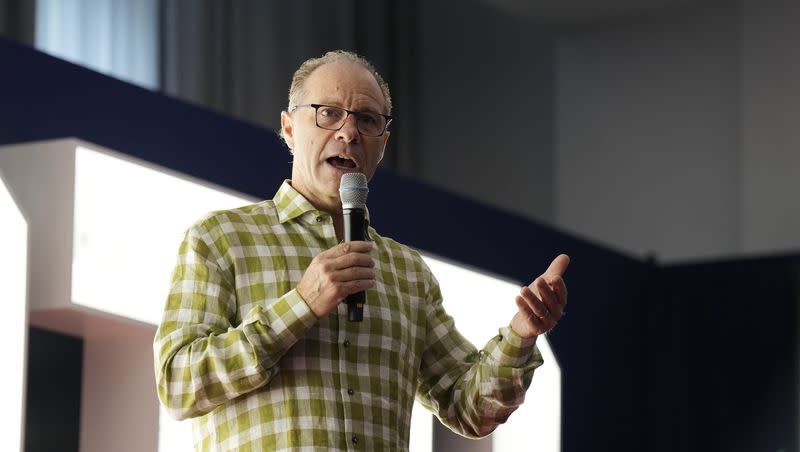
- Oops!Something went wrong.Please try again later.
- Oops!Something went wrong.Please try again later.
- Oops!Something went wrong.Please try again later.
- Oops!Something went wrong.Please try again later.
- Oops!Something went wrong.Please try again later.
BOSTON — For his first interview with Tom Brady in September 2019, Jeff Benedict arrived three hours early. In his notebook were 25 questions that he had been fine-tuning for hours.
“I went to the extreme to be prepared. I wanted it to go as close to perfect as I could,” he told me, describing what would be the first of many sessions with the star quarterback, part of 18 months of research he put into writing “The Dynasty.”
After arriving at Gillette Stadium, Benedict had been admitted to the luxury suite where Brady’s family watched him play during home games. Sitting there alone, waiting for Brady to arrive, Benedict thought about the big decisions looming for the 42-year-old quarterback who was entering what many thought would be his last season with the Patriots. What was on Brady’s mind?
In his book, which would be published a year later, Benedict answered the question, and invited readers into the suite with him: “Pondering, (Brady) took one more look at the empty stadium where he had evolved from a recent college graduate to a middle-aged man. ‘How did all of this happen?’ he wondered.”
He then took readers on a journey through one of professional football’s most legendary teams, a story that has been made into a 10-part docuseries that debuts Friday on Apple TV+. It’s the same sort of journey that he’s taken in 16 other books, including biographies of LeBron James and Tiger Woods (written with Armen Keteyian).
For “The Dynasty,” Benedict spent 18 months interviewing key figures in the Patriots franchise, including owner Robert Kraft and coach Bill Belichick, to understand how one of the greatest football dynasties in sports history was built and sustained for 20 years.
But even before writing the book, Benedict, 57, knew the story would make a compelling visual adaptation. “I thought it was this big American contemporary story that would make a great movie or a great series on television,” he told me. Benedict wrote and produced the series, along with director Matthew Hamachek. It will be released over the course of five weeks with two episodes dropping every Friday night.
While Benedict’s last three books track the narratives of some of the most important athletes — he thinks of the stories of Woods, James and the Patriots as “sister” books — he doesn’t consider himself a sports writer. “It’s less about sports than it is about being the best in the world at one thing,” Benedict told me. “Athletes provide a great lane for that.”
He says he is drawn to getting as close to extraordinary excellence as possible, trying to understand the struggles and the motivations of people the world sees as the “greatest of all time” in their field.
How ‘The Dynasty’ came to AppleTV+
In the weeks leading up to the series’ release, the publicity machine for “The Dynasty” was in full swing. On the morning of Feb. 1, I was with Benedict as he took back-to-back calls: first with journalists, then an interview with Mike Krzyzewski, the former Duke University basketball coach, and another one with the “Eye on Foxborough” podcast.
For nearly four hours, without stepping out of the glass-walled conference room, Benedict answered questions nonstop while managing to stay chipper and unrehearsed. “Do you ever run out of steam?” I asked him. He laughed and said no. “Having a lot to do is really important,” he said. “You never want to have lags.”
Earlier that day, Benedict had driven two hours from Waterford, Connecticut, where he lives with his wife, Lydia, and their four children. On this trip, he was accompanied by his 23-year-old son, Clancy, who works full time for Benedict as a chief technology specialist, managing various technological aspects of Benedict’s work. Benedict was excited for the evening plans: They would see James and the Los Angeles Lakers take on the Boston Celtics at TD Garden that night. But there was work to do before the big game.
Adapting a book to television is not entirely new for Benedict: Four of his books became documentaries, including a two-part series for HBO based on the Woods biography; it was the first project on which he collaborated with Hamachek. But “The Dynasty” has been more ambitious in scope than any of Benedict’s previous adaptations.
Hamachek and Benedict assembled a team of 50 people to sift through nearly 35,000 hours of the Patriots’ interviews and footage. Chiseling out 10 episodes from this material felt overwhelming at times, Benedict said, and over the course of two years, the team worked under rigorous deadlines, narrowing down the wealth of interviews and archival footage to what told the broader story of the dynasty. “You had to really settle on what story we were telling,” Benedict said.
The book served as a “proving ground” of sorts for the trust Benedict had cultivated with Kraft, Belichick, Brady and others. “As people get more comfortable, they will reveal more, and that’s certainly what happened here,” he told me.
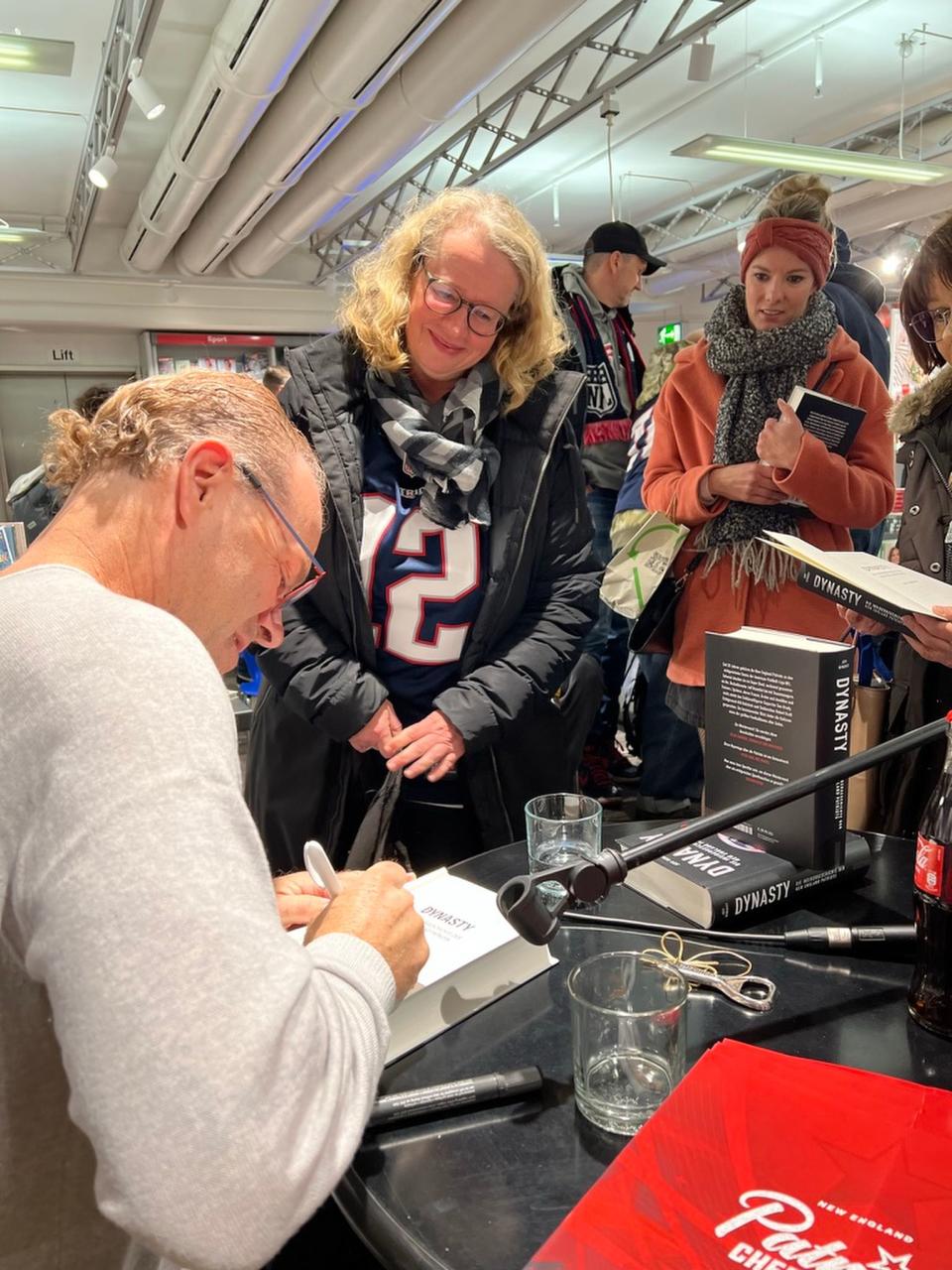
‘Like you’re watching a Spielberg movie’
For Benedict, getting inside the Patriots started with a big idea. He believes there have been three great football dynasties: the Packers in the 1960s, the Steelers in the 1970s, and the 49ers of the 1980s and 1990s. Those dynasties lasted a decade or less, while the Patriots’ lasted for 20 years. Benedict knew the story he wanted to tell: How did Kraft build his dynasty and how did he manage to maintain it for so long?
Benedict was an outsider, with no connections to the team, so he wrote Kraft a letter, proposing the idea for the book and asking for access to the team. He wanted to tell a story in which the owner had “equal billing with the quarterback and the coach” — a story that hadn’t really been told by anyone else before. As part of his pitch, Benedict listed people who could vouch for him: Steve Young, the former quarterback of the 49ers, who had commissioned Benedict to write his biography; Krzyzewski; and Danny Ainge, then president of the Celtics. Six months later, Kraft responded to Benedict with an invitation to come to Gillette Stadium for a meeting.
In a way, gaining the most coveted access to a legendary sports team was about simply asking to be let in, and then building trust. “If there are a lot of people who wish they could go inside the Patriots and write a definitive book on them, nobody asked,” Benedict said. That’s sometimes how the best book ideas come about, he told me. “They’re literally in plain sight and everybody’s walking around it and nobody is saying ‘we should do that.’”
Hamachek, director of “The Dynasty,” told me that Benedict’s cinematic way of writing nonfiction organically lends itself to making a series. “He sets the scenes and characters in a way that feels like you’re watching a Spielberg movie,” he said.
Yet what works well in the books doesn’t always translate directly on the screen. “When you’re using a book as a springboard for a series, you can’t print a page out of a book and feed it into a computer and have it spit out a scene,” Hamachek said. That’s where Benedict’s work at trust-building helped people open up in front of the camera. “With the people he interacts with and interviews, he forms long-lasting bonds with them and that’s what he brought along with institutional knowledge,” Hamachek said. “The relationship and his ability to cultivate those is one of his superpowers.”
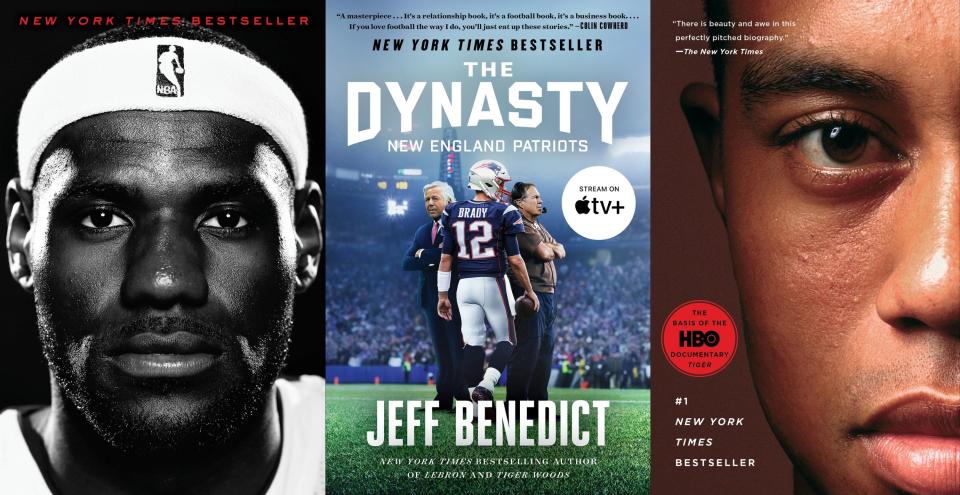
A practical approach to writing
“LeBron is not playing tonight.” Benedict shared the disappointing news with his friend Justin Lindsey, as they settled at a table in Legends, a members-only restaurant inside TD Garden, before the game started. Benedict heard the news earlier that day when he did a TV interview with a local CBS affiliate. It’s probably an injury, Benedict speculated, as he dove into his cheese and duck quesadilla.
Benedict and Lindsey met in Boston in the 1990s, when the two coached youth basketball. Lindsey described Benedict as his “most low-maintenance friend” — they can go months without seeing each other, often just texting during big games. Yet after three decades, they remain close. Lindsey has watched Benedict’s star rise over the years, as he kept adding biographies of high-profile athletes to his résumé. “None of this success I find surprising,” Lindsey told me. Benedict is “old-school” hardworking, he says. “I don’t think it’s something he thinks about, I think that’s just who he is.”
Benedict works almost every day and says he feels guilty when he takes a day off. He has already carefully planned out this year, with certain weeks and months allocated for press interviews, research and going into “a cave” to write. “When I’m writing, I don’t do anything else,” he said. “It’s the only way you can produce.”
This work ethic, he speculates, comes from his upbringing in southeastern Connecticut, the state’s center for fishing and whaling industries, where all the men in his family worked manual-labor jobs. To put himself through college — Eastern Connecticut State University, where he majored in American history — Benedict worked for his uncles, laying concrete foundations for houses. The morning after Benedict returned home from a Latter-Day Saint mission in Seattle, his uncle showed up with a tool belt, asking if Benedict wanted a job. Within hours, Benedict was working at a construction site.
He applies this blue-collar approach to writing, he told me. “Everyone in the construction business is hand-to-mouth,” said Benedict, who works out of an office inside the Garde Arts Center in New London, Connecticut. “There is no ego, no pride — and that’s my approach to writing.”
Before writing books, Benedict wrote briefs and memos. After earning his undergraduate degree, he went to law school at Northeastern University and worked for the chief prosecutor in the child victims unit at the district attorney’s office in Boston. Right out of law school, he wrote “No Bone Unturned,” a nonfiction book about a Smithsonian forensic scientist at the center of a landmark case involving a 9,000-year-old skeleton.
His earlier narratives focused on violence against women, a deadly E. coli outbreak (which inspired a Netflix documentary, “Poisoned: The Dirty Truth About Your Food”) and casino expansion in Connecticut. He even had a short stint in politics, when he announced a run for Congress as a Democrat one month before 9/11. (He lost to Joe Courtney in the primary, who remains the representative for Benedict’s home district.)
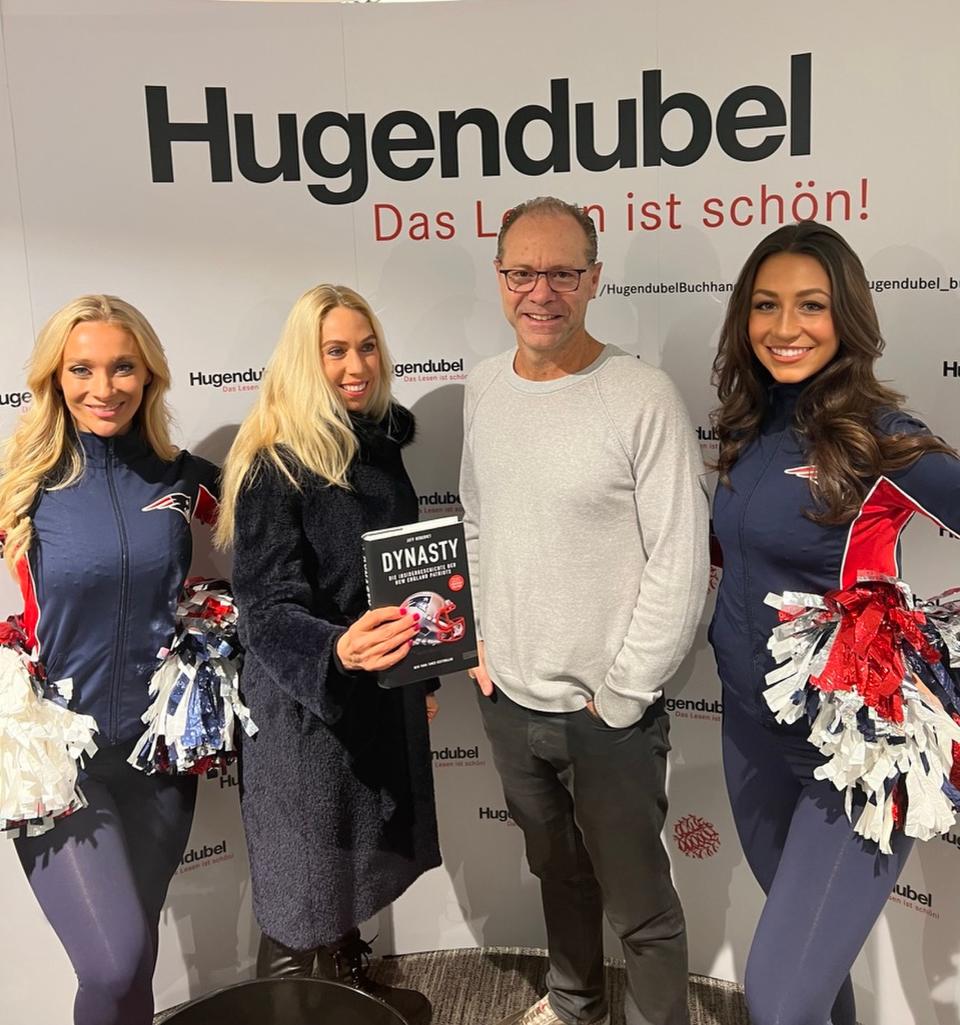
Related
The pivot to writing biographies was intentional, Benedict told me. Writing about the world’s most celebrated athletes widened his readership. “Moving into the biography space has allowed me to not only stay in the business, but grow the business a lot,” he said. And partnerships with major TV streaming platforms and production studios have provided the kind of continuity and financial stability that allows Benedict to keep writing books. “And the publishing side is the most important part of my business, because it’s the backbone of everything else,” he said.
Catching passes for Steve Young
Early in the second quarter of the Lakers-Celtics game, Benedict’s attention turned to the corner of the court, where James, wearing gray pants, a jean jacket and light blue sneakers, had taken a seat on the bench next to his fellow co-star Anthony Davis, who also was not playing. With the stars’ arrival, the arena buzzed with new energy. Benedict’s son snapped a closeup of James with his cellphone and passed the phone to show his dad. “That’s what’s so appealing to me about sports — there’s almost a mythical quality to the great athletes,” Benedict said.
Amid thousands of people that night, Benedict likely knew James better than anyone else in the arena. Yet they have never spoken to each other, Benedict tells me — he did not get access to James, and Benedict understood why. “There is no incentive for someone like LeBron to cooperate for a book that he doesn’t control,” he said. Just like with Woods, Benedict told the story of their life by doing deep research and talking to people around them. “You can’t walk away from the book about LeBron without tons of respect for him — the fact that he didn’t control it gives it more credibility,” Benedict said.
But there were times in Benedict’s career when he got so close to his subject that he became more than an observer. Benedict was working with Young on his biography when they went to Candlestick Park in San Francisco to film some passes for an NFL Films documentary right before the stadium was about to be demolished. When a volunteer was needed to catch Young’s passes, Benedict stepped in. “I remember being nervous — what if I dropped it?” he said.
Nobody else was at the stadium, except mesmerized construction workers, who watched in awe. The sky was clear and blue that day, Benedict remembered. “When it was happening, I was thinking — it’s unbelievable that growing up in southeastern Connecticut as a kid, watching him play some epic games in that historic stadium and to be there when they were knocking it down and have him throwing footballs to me was one of the most remarkable moments of my whole career.”
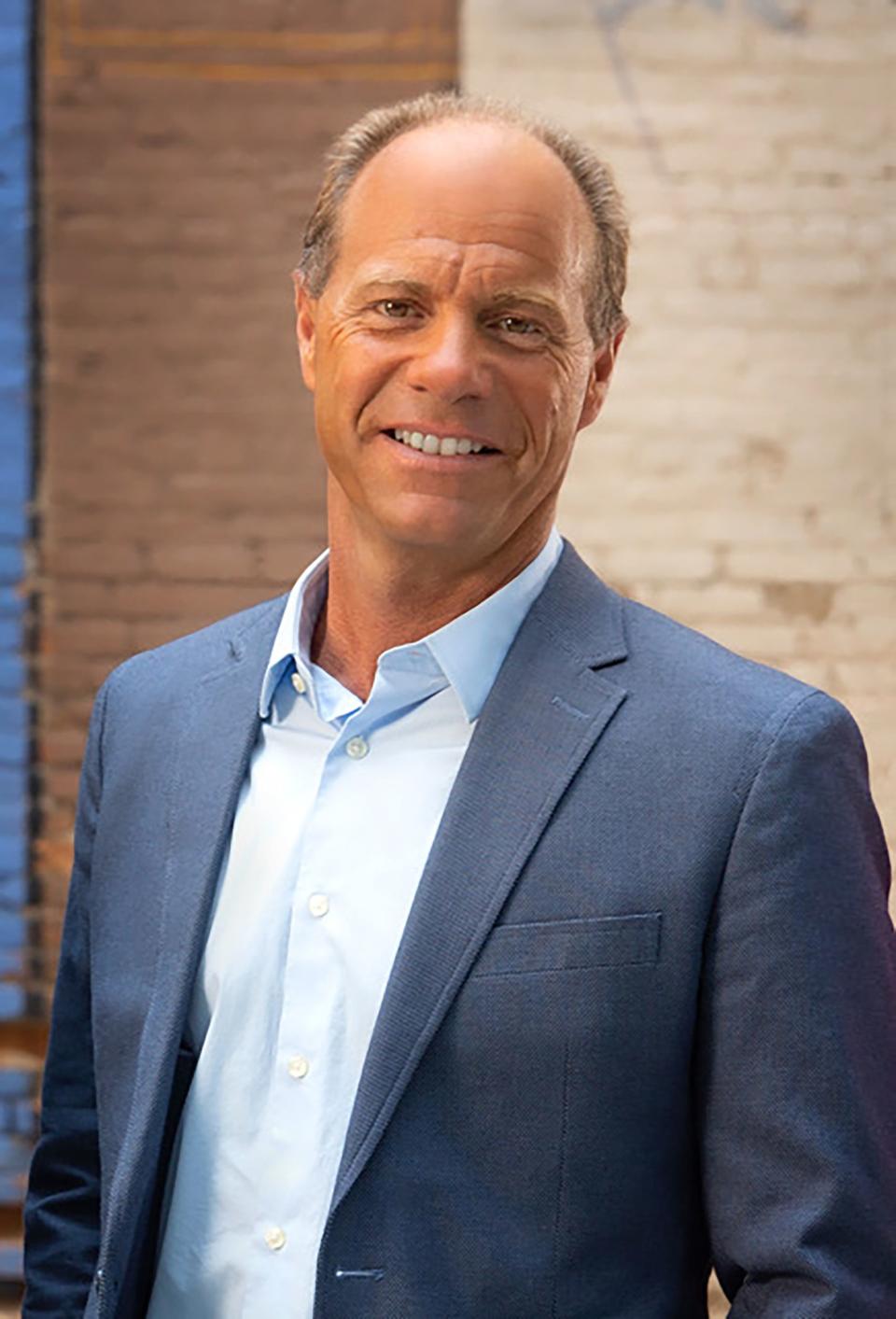
A poignant ending to ‘The Dynasty’
Even without their star players, the Lakers upset the Celtics. Fans clad in green left the arena visibly disappointed — Benedict not so much. He would root for the Lakers against any other franchise, he said, “but not against our team.”
He is, after all, from New England.
Benedict’s eyes well up, talking about writing the epilogue to “The Dynasty,” where Brady is saying goodbye to Kraft and Belichick as he prepared to join the Tampa Bay Buccaneers. While writing those scenes, Benedict listened to The Beatles’ “Abbey Road” on repeat. The finality of the moment — so similar to Paul McCartney and John Lennon parting ways — was an intense experience, he said. “I wrote that chapter in a weekend and it was one of the most intense emotional things I’ve ever written,” Benedict told Krzyzewski. “They made magic and they walked away,” he said.
Belichick, of course, has since “mutually parted ways” with the Patriots, and Brady has retired from the NFL and is set to become an analyst for Fox this year.
In an op-ed for The New York Times published in January, Benedict reflected on the relationships that held the team together for so long. “The unusual durability of the Belichick-Kraft marriage was rooted in mutual respect and a series of unconventional decisions early on in their partnership,” Benedict wrote. “Keeping Belichick and Brady together for 20 years was Kraft’s greatest singular achievement.”
Hearing from fans of other teams who gained new respect for the Patriots after reading “The Dynasty” was incredibly rewarding, Benedict told me. He writes to entertain people first, he said. “But in the course of entertaining them, hopefully they get inspired a little bit and learn something.”
He hopes the new docuseries will do the same. “Maybe their opinion of a person becomes more textured,” Benedict told me. “It’s also about getting something out of it — it’s shifting the way people see the world.”

